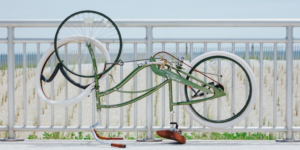The way Christians die is the most contagious aspect of what being a Christian means. – William Frazier a Maryknoll Priest
I can’t help it, I just love starting new things. I always love getting in at the ground level of something new—molding, forming, and building.
I don’t know how much of that desire stems from my days in the Engineering world, being fresh out of Engineering school and helping design new structures, or from my days as a kid who loved to build with Legos and follow my dad around on the weekends constructing decks and garages.
After a transforming time in college, I became less interested in building physical structures and more fascinated with constructing social structures such as Youth Programs, a Community Coffee Shop, Church Planting over the last 10 years, and now, Local Community Networks.
While building, I ask questions such as: Why do people do the things people do? What are the natural reflexes of a culture? How are they being shaped, and can they be shifted?
Sparking Innovation
All that said, I love the ability of envisioning something new from concept and theory to a real-life finished product; that is if we can ever say there is a finished product.
Recently, in reading Futurist Bob Johansen’s book, The New Leadership Literacies, I was reminded that we live in a constant flux of change. Or, maybe as he better stated, “we live now in a constant time of disruption,” which by his definition, are breaks in the patterns of change.
Johansen states that these disruptions almost always spark innovation. I love this statement because I love Innovation! I love sitting with a group of people dreaming and strategizing for a better future—creating anew through creating social change.
Embracing Risk and Failure
However, he also states that disruption is extreme and unpredictable. The writer says you can’t always see where the problems are and where they are arising. Therefore, they can take a long time to play out which leads to constant adjusting, constant risk taking, and, yes, constant failing.
When you are in the world of starting things you have to learn the grace of falling well… learning with each step, stumble, and sometimes-complete fall. But you can’t have innovation without struggle, and, as my new friend states, you can’t move into the future without learning to embrace not only a constant flux of change, but also disruption.
Disruption in Church Planting
With starting a church comes what feels like unending change. There is continual planning and re-planning, organizing and re-organizing, and strategizing and re-strategizing.
Not only is church planting a constant change, but we live in a time and season of disruption culturally, where the church is having to learn new ways forward.
Our new ways forward, I believe, are a re-discovering of the ancient ways of what it looks like to be the church… a more incarnational way rather than a programmatic way. A way forward focusing more on a set of spiritual practices or pathways towards greater transformation rather than just a gathering of crowds of people listening to a sermon.
Seeing Christian habits develop within a community of faith that are countercultural. Re-discovering a Missional Theology where God has gone before us and is in the process of restoring all things back to His reign and rule as we learn once again to scatter seeds and allow the Lord to be the Lord of the Harvest.
A Movement Ecclesiology where we ask questions of discipleship and multiplication at the most basic and core levels by seeing the development of rooted oikos’ in the neighborhood for the common good of that neighborhood. Joining an ecumenical group of Christ Followers together praying for the Kingdom of God to be reflected on earth as it is in Heaven.
Learning to Love Disruption
Moving into this new ancient ways creates a future with much innovation and experimentation, but also riding in the same vehicle is constant change and disruption. Naturally loving this world of innovation and experimentation, I am learning to love this world of disruption.
While choosing to live into disruption, desiring to find the way forward, I’ve had to learn a Godly Patience and release. I’ve had to learn what it means to die. I’ve had to learn that not everything that I put my hands to is meant to live on in God’s Divine Plan. Some of the things we’ve started are still living on past us—this is glorious to see.
Other things? We’ve had to learn grace and allow their death, because, as Jesus stated, “unless a grain of wheat falls to the ground and dies it can’t bear much fruit”, a quote by Jesus that many of us want to pretend was never said. Our ego seeks success, while our souls need humility, and fruitfulness of the Kingdom comes through simple obedience and faithfulness.
Kenosis
One of the key scriptural principles I’ve learned to embrace is the Greek Word Kenosis which is the self-emptying act of God’s own divine nature.
Philippians 2:7 says that Jesus emptied himself, made himself nothing taking on the very nature of God. John the Baptist in John 3:30 displayed this nature of Jesus when he said “I must become less and he must become greater”.
We see this within the Trinity, with the Father emptying himself into the Son Jesus as the Logos mentioned in John 1. Then, Jesus emptying himself when ascending to Heaven and sending the Spirit who now follows this Kenotic Path pointing back to the Father.
As the Cappadocian Fathers believed, the Incarnation flows from the Kenotic nature of God that is highlighted through the incarnation of the Trinity.
A Different Way Forward
This self-emptying act seen through the nature of God and spoken of throughout the scriptures is foreign to our Western Culture. Our society falsely believes that the way forward is the way up, when, actually, the way forward is to decrease and take the path less desirable and less traveled.
Our society falsely believes that the way forward is the way up - Mike Pumphrey Click To TweetThis is spiritually and culturally counter-intuitive. As the Trinity modeled and Jesus often spoke about “I must decrease, so that He might increase”.
Therefore, within our God given desires to create, to explore, and to invent new ways forward in an era where embracing the disruptive needs to become a natural reflex, we need to allow failure and loss to create a beautiful outflow of the Spirit’s Incarnation through us to the world.
It is through these momentary lapses of progress where, if trusted and searched deep enough, comes the largest window of opportunity for God’s Kingdom to be shown on Earth as it is in Heaven.
Through our death comes the greatest opportunities for innovation and we may be gloriously sanctified in the process. How will you choose to die that it becomes the most contagious aspect of you?

Share this Post

